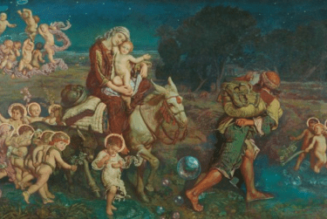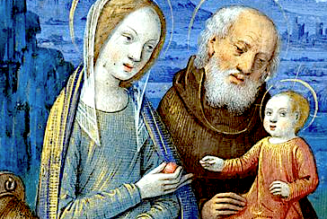
Imagine the following scenario, and never mind how entirely insane it may seem. You must permit each man his own metaphor. Here, then, is mine.
You are to picture yourself happily ensconced in an airplane as it hurtles across an ocean sky some 40,000 feet high. But, as they say, there is always a worm in the apple, and so while you sit back amid the first-class comforts of your cabin, savoring your salmon and Chablis, certain mechanical problems have developed in one of the engines, the seriousness of which will, in a matter of minutes, cause the plane to blow up, sending a thousand fiery fragments into the sea, yourself included.
Only you manage to survive, a castaway miraculously preserved on this surprisingly pleasant stretch of sand somewhere in the South Pacific. And no sooner have you wandered off from the crash site, you notice this strange bottle having washed up onto the beach. No, it is not the unfinished Chablis, but a different bottle, one with a message on the inside, which you are just clever enough to open and decipher.
So, what is the message? Is it a set of instructions for getting off the island? Or perhaps a map identifying the nearest first aid station? No, it isn’t anything of the sort. Instead, the message contains only two sentences: “In the beginning was the Word. And the Word became flesh and dwelt among us.”
How does one decode a message like that? Does it even compute? Or, putting it a little differently, is there anything in the message that may prove necessary or useful for you and anyone else who reads it to know? Yes, there are two things, actually — two realities, each totally disparate from the other, which have been oddly wedded together and which can no longer be separated one from the other.
Word and flesh. Or, in the Latin, Verbum and caro. Then, passing over to the Greek, Logos and sarx. An extraordinary, stunning conjunction of two utterly unlike things, which happen to be the chief bookends between which the whole of Christianity may be located. Here, in fact, is the central, pivotal event of human history. In a word, Incarnation.
On the one side there is God; on the other the broken world into which he freely enters, determined to tell his own story in the midst of the brokenness of our own stories. Which, when left to their own devices, like scattered parts of a doomed airplane, cannot put themselves together again. The world needs, far more than it can even surmise, not just the God who dwells in unapproachable light beyond the sky and the stars, but the God who, in the astonishing event of his enfleshment, gathers up all that flotsam and jetsam in order to make us whole again.
And so eternity erupts into time. Heaven into history. Meaning into matter. The Glory of the Lord has long since left his footprint amid all the grit and grotesquerie of a broken world. Divinity pitching its tent in the dust and the dirt in order to raise up a fallen race.
What is implied by an assertion like that? At the very least, these three things.
One, that it happened. In history, which is to say, in the order of existence, not in the realm of ideas.
Two, that in doing so God has made himself accessible, invocable; we can, as it were, call him up and talk to him. He has come so close to us that we can reach out and touch him. Lay hands upon him and, in the most perverse exercise of human freedom imaginable, torture him slowly to death.
And, finally, point three, there is no going back to a time before it all happened. Nothing and no one can remain the same once the Incarnation took place. There is no escaping the fact, or the impact, of that particular collision. Everything exists now within the ambit of that single indivisible Word, leaving nothing untouched, undisturbed from the sheer
all-enveloping reach of God-become-Man.
And, so, it really did happen, this bedrock certitude of human history, defined by Joseph Ratzinger in his wonderful book, Introduction To Christianity, as nothing less than “the ineradicable positivity of Christianity,” unfolding in the midst of all the muck and the mire of this concrete world. Indeed, it reaches right down to the very bottom of our socks. And then some — stretching down, down, down into the very darkness of death, the shame and the silence of Sheol. In order that, like a mighty mobile, it might then raise everything up to God.
That is the precise challenge we face. To make the Event of Jesus Christ believable to the men and women of our time. To do that, of course, we must first believe it ourselves, entrusting our lives to what we believe. “The hint half guessed, the gift half understood,” writes T.S. Eliot, “is Incarnation. / Here the impossible union / Of spheres of existence is actual,
/ Here the past and future / Are conquered, and reconciled.”
If we but cling to that point, which is the still point, it matters not a whit how wildly the world turns — may it spin ever out of control, yes, even like a jet airplane in freefall — the Cross shall stand steady in the midst of all the chaos.
Join Our Telegram Group : Salvation & Prosperity








